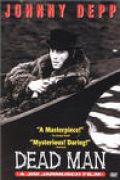
Directed by
Jim Jarmusch
117 minutes
Rated R
Reviewed by
Bernard Hemingway

Dead Man
Synopsis: William Blake (Johnny Depp), a recently orphaned accountant from Cleveland is heading out West to the frontier town of Machine to take up a job. Things quickly go wrong for the mild-mannered Blake and he finds himself accused of murder and pursued by bounty hunters. After he is shot by a trio of ne'er-do-wells a peripatetic Indian named Nobody (Gary Farmer) nurses him to health and serves as his spiritual guide on his journey.
With his instantly-recognisable hipster style Jim Jarmusch has managed to keep making auteur films that are quirky without pushing the envelope overmuch. In Dead Man, his first feature since 1992's Night on Earth, he returns to the minimalist style with which he made his name in Stranger Than Paradise (1984) most notably with the black and white photography (this time courtesy of Robby Müller) as he heads out West and back to the 1870s with the Crown Prince of Hipness, Johnny Depp.
Jarmusch's spare story, told with limited dialogue, is delivered with exemplary pop-cultural savoir-faire - Müller's camera lovingly frames Depp's chiselled features in close-up, Iggy Pop appears as a low life given to cross-dressing and reading from the Bible, screen veteran Robert Mitchum plays an eccentric factory owner and John Hurt as his senior manager, whilst Neil Young's distorted guitar provides the film's main aural counterpoint.
There is a pivotal scene early in the film in which Blake, in bed with a former prostitute (Mili Avital), extracts a six-shooter from under her pillow. "Why do you have this?" he asks her. "'Cause this is America," she explains. This would seem to encapsulate the central idea of Jarmusch's film.
The Western, the uniquely American film form, is chicken-and-egg-like related to its gun culture and accompanying ideology of individualism and Dead Man seems to be both an indictment of senseless gun-play (there are various cold blooded murders, not to mention a particularly revolting incident involving a squashed skull), By extension it is also a satire in general of the world-view of the "stupid white man", and a mythopoeticisation of Depp's Blake as the instrument of cleansing Death as he is transformed from bean-counter in a "clown suit" to local legend and honorary Native American, thanks to his good luck with guns. These are themes to which Jarmusch would return to in his 2000 masterpiece, Ghost Dog: Way Of The Samurai. .
For the most part the film's irreverent, blackly comedic and a-historical approach to the Western as a genre is entertaining enough and Depp is particularly good as the indefatigable accountant with no knowledge of his famous namesake, although, like Young's guitar what initially is strikingly effective tends to become rather monotonous in the latter stages.
Show detailed review
Want something different?





